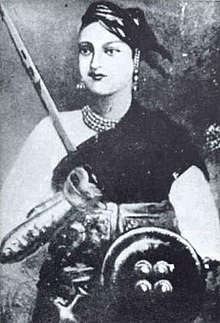Free Courses Sale ends Soon, Get It Now


Free Courses Sale ends Soon, Get It Now



Disclaimer: Copyright infringement not intended.
Context
The Prime Minister, Shri Narendra Modi paid heartfelt tributes to the symbol of the bravery of Indian women power, Rani Lakshmibai on her birth anniversary.
Details
Early Life and Background
Rani Lakshmibai's Role in the Rebellion of 1857
Legacy and Contribution to India's Freedom Movement
Death and Legacy
Conclusion
Rani Lakshmibai's indomitable spirit, determination, and sacrifices for the nation have immortalized her as a symbol of bravery and patriotism in India's fight against colonial rule, earning her a revered place in the annals of Indian history.
|
PRACTICE QUESTION Q. Rani Lakshmibai is often considered a symbol of resistance and courage during India's struggle for independence. Discuss her role in the Rebellion of 1857 and the impact of her leadership on the Indian freedom movement. (250 Words) |
© 2024 iasgyan. All right reserved